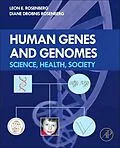In the nearly 60 years since Watson and Crick proposed the double helical structure of DNA, the molecule of heredity, waves of discoveries have made genetics the most thrilling field in the sciences. The study of genes and genomics today explores all aspects of the life with relevance in the lab, in the doctor's office, in the courtroom and even in social relationships. In this helpful guidebook, one of the most respected and accomplished human geneticists of our time communicates the importance of genes and genomics studies in all aspects of life. With the use of core concepts and the integration of extensive references, this book provides students and professionals alike with the most in-depth view of the current state of the science and its relevance across disciplines. - Bridges the gap between basic human genetic understanding and one of the most promising avenues for advances in the diagnosis, prevention and treatment of human disease - Includes the latest information on diagnostic testing, population screening, predicting disease susceptibility, pharmacogenomics and more - Explores ethical, legal, regulatory and economic aspects of genomics in medicine - Integrates historical (classical) genetics approach with the latest discoveries in structural and functional genomics
Autorentext
Since 1998, Leon E. Rosenberg has been a professor in the Department of Molecular Biology and the Woodrow Wilson School of Public and International Affairs at Princeton University. From 1991 to 1998, Rosenberg was Chief Scientific Officer of the Bristol-Myers Squibb Company.
During Rosenberg's 26 year affiliation with Yale, he was the dean of Yale University School of Medicine, research geneticist, clinician, administrator, professor of human genetics, pediatrics, and medicine, and the first chairman of the Department of Human Genetics. Rosenberg and his colleagues conducted pioneering laboratory investigations into the molecular basis of several inherited disorders of amino acid and organic acid metabolism.
Rosenberg received summa cum laude BA and MD degrees from the University of Wisconsin. He completed his internship and residency training in internal medicine at Columbia-Presbyterian Medical Center in New York City. Afterward, he moved to Bethesda, Maryland, to begin a six-year association as an investigator with the metabolism service of the National Cancer Institute.
Dr. Rosenberg's honors include election to the National Academy of Sciences and to the Institute of Medicine, recipient of the Borden Award from the American Academy of Pediatrics and of the Kober Medal from the Association of American Physicians, and honorary Doctor of Science degrees from the University of Wisconsin and the Mt. Sinai School of Medicine. Rosenberg was the medalist for the Australian Society for Medical Research in 2002. He is a past president of the American Society of Human Genetics, the Association of American Physicians, the Funding First Initiative of the Mary Lasker Trust, and the Association of Patient Oriented Research.
Inhalt
Part 1 Introduction and Core Concepts 1. Framing the Field 2. Introducing the CORE CONCEPTS 3. Genetic Variability 4. Growth, Development, and Reproduction 5. Transmission of Genes 6. Structure of Genes, Chromosomes, and Genomes 7. Expression of Genes and Genomes 8. Mutation 9. Biological Evolution 10. Human Individuality
Part 2 Genetic Disorders 11. Chromosome Abnormalities 12. Single-Gene Defects 13. Multifactorial Traits 14. Disorders of Variable Genomic Architecture 15. Birth Defects 16. The Genetics of Cancer 17. Detection and Treatment of Genetic Disorders
Part 3 Populations and Individuals 18. Population and Evolutionary Genetics 19. Personalized Genetics and Genomics
